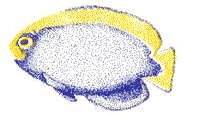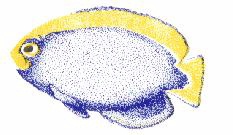|
A Concise Methodology for Introducing Frozen Mysis Shrimp as a Food Source for Captive Seahorses
By Chris Burns, Mike Gilbert and Bethany Watson
Anyone who has kept, or even considered keeping, seahorses has probably
encountered the adage that maintaining proper nutrition in these animals
is the single-most difficult aspect to their husbandry. For the most
part it seems that the ďcommon knowledgeĒ is that seahorses eat only live
foods and unless you can provide these foods for them, you shouldnít endeavor
to keep them in a home aquarium. This leaves most folks who are not
fortunate enough to live near the ocean or an inland lake seeking food
sources such as brine shrimp, ghost shrimp, and various other small crustaceans.
There are potential problems with all of these food sources. Often
times ghost shrimp are either prohibitively expensive or impossible to
find, and most people are not necessarily looking to set up a breeding
tank dedicated just to them. Brine shrimp are a very poor source
of nutrition without being properly enriched, and even then their nutritional
value is somewhat suspect. The varieties of other crustaceans available
are difficult to rear or not eaten by the herd. So, what is a seahorse
aficionado to do? Well, in this article, we will hopefully provide
a solution that will supply the herd with an EXCELLENT source of nutrition
as well as the aquarist a very simple, cost effective and minimally time
consuming way to deliver it.
You may have already guessed that this food source is frozen freshwater
mysis shrimp (Mysis relicta). They can be purchased at most live
fish stores and usually come in 4 or 8 ounce packages, with 4 ounces being
roughly equivalent to 10,000 shrimps. An adult seahorse will typically
consume between 3 and 12 of these shrimps per day depending on the size
of the horse. This may seem like a low number, but due to the nutritional
makeup of these shrimps, especially their fat content, they seem to be
quite filling. So, as you can plainly see, a single package could
last a single horse for years!! Mysis are also, as previously stated,
an EXCELLENT source of nutrition for seahorses (or any marine fish for
that matter) for two reasons. First, M. relicta are freshwater creatures,
which means that when your marine animals consume them, they will not need
to expend excess energy to eliminate the extra salt they have taken in.
Most marine creatures expend great deals of energy expelling salts just
due to their environment, and the oral intake of even more salt taxes their
system that much more. Second, M. relicta have an extremely varied
feeding cycle. During the day, they are benthic detritivores (bottom-dwelling
poop-eaters) but at night, they migrate to the surface and feed on the
planktonic layer, taking in rotifers, protozoans, pollen grains and several
species of algae. As an added bonus, possibly due to
their highly diversified eating habits, M. relicta contains very large
quantities of naturally occurring fatty acids (Stearic, Palmitic, Oleic,
Omega-3 and Omega-6 to name a few) that not only provide marine animals
with essential nutrition but also stimulates a positive feeding response.
That said, letís look at how we can get our finicky seahorses to not only
accept this alternate food source, but learn to relish it!
We will present two methods you can try. Both work equally well,
but are dependent on the disposition of your animals.
Method #1:
The first thing you will need is a good turkey baster with a CLEAR
tube. This is very important part, since the horses cannot really
see the tube if it is clear. You will also need some frozen mysis
shrimp (we HIGHLY recommend Piscine Energetics M.Y.S.I.S. for its size,
consistency and quality) and some brine shrimp or other live food that
your horses will readily eat.
Next, take small amount of Piscine
Energetics Mysis (not too much at this point) and thaw it out in some
tank water. Try to ďmushĒ the individual shrimp some so as
to create a milky solution with the water. The cloudiness in
the water is the fatty acids we mentioned earlier. Now, release 20
or so brine shrimp (or whatever live food you chose) into the tank and
when your horses begin eating, suck up some of the mysis water and squirt
it into the tank near your horses. You may need to do this for several
days. This will get the horses used to the taste of the mysis as they are
eating so that they will associate that flavor with food. It is very
important to do this conservatively, as you do not want to pollute the
water with the fatty solution.
The next step is to try getting your herd to eat the actual shrimp.
Some horses will go right to them without even needing the previous step,
and other may take a while to adjust to the taste, so your process will
probably vary. As a reference, a quarter sized chunk feeds my seven
horses with a bit left over for my baby trigger and puffer. Now,
thaw the chunk in some tank water and then suck up a good amount of the
shrimps. Squirt a mysis shrimp down to the end of the tube, but keep
it inside the tube. You want just the end of it hanging out. You can mimic
movement by squeezing and releasing the bulb very slightly. Take the animated
shrimp over to one of your horses, and wait patiently. I (Chris) have several
horses that will actually rapidly approach and snick the mysis right out
of the end of the tube as soon as it goes into the water!!!
Once they begin eating the mysis, you should be able to just squirt
them into the tank. I try to squirt them onto the top of the rock-work
or into the macro algae. Then the horses will "hunt". They will pick over
the rocks and through the algae and snick up whatever they find!
You are home free from that point on, and can use the P.E. mysis as your
primary food source, with occasional supplementations of other live food
for variety and fun.
Method #2:
As a second method which seems to also work is, you can work them onto
frozen mysis by hand feeding them using live food in the beginning, meaning
ghost shrimp. The way to do this is to use smaller ghost shrimp and
to begin getting your fish to take them from your hand. This method
where you hand feed may or may not work. Some fish are really too
timid to take ghost shrimp even from your hands. We have found that
most of the time, they are so hungry that they donít care that we are holding
onto the ghost shrimp. They just see it flicking its tail, and theyíre
hooked. They go in for the kill and suck them down.
We hold the ghost shrimp between our thumb and forefinger either by
their whiskers, or just above them around their eyes. The trick is
to use enough of a grip to hold the shrimp and prevent it from getting
away, but not so much that your seahorse canít get it out of your fingers.
After trying once or twice, most people get the hang of it, and it isnít
a problem from there on. After a couple of feedings with ghost shrimp,
you can try using a mysis.
We thaw mysis and then pick them out individually so that we have whole
mysis to feed to our fish. They look virtually the same as ghost
shrimp, which is another really great thing about these mysis. They
thaw whole and usually stay that way. Of course, you will always
get a blend of heads or tails, but for the most part, Piscene Energetics
mysis thaws out as whole shrimp.
Be sure to hold the mysis the same way that you hold a ghost shrimp.
You might have to gently wiggle it so that it looks alive. We usually
give it a gentle, but somewhat sharp, wiggle so that it mimics the motion
of a ghost shrimp. Typically, our fish take it right from us because
they think they are getting ghost shrimp, when in fact, itís a mysis.
The thing is that they donít know that the mysis is dead. That
is why we wiggle it a little. It gives them the illusion that the
mysis is still alive and kicking (literally). Sometimes they figure
it out, but that is rare. The other trick to doing this is that they
never see the head of the ghost shrimp or the mysis. They just seem
to assume that it has one and that the eyes would move (or look at them
in utter horror), were they to see it. If they canít see the head
or the eyes, they really donít seem to know the difference between live
and dead food.
Not to mention, a mysis shrimp really stinks. Of course, to our
fish this smells really tasty, and they usually go after the mysis shrimp
with vigor.
Many of our fish will eventually eat the mysis that we thaw when it
is in the water column, and even better, lots of other ones will eat it
even when it is on the bottom of the tank. They donít seem to mind.
Most of them go for it because it smells good and tastes good too.
We donít have to hand feed very many of our fish anymore, which is also
really good. They just eat it of their own volition.
Once again, you just have to experiment to see what works with this
method. We like to feed them by hand because it gives us a chance
to make sure that the fish, especially the picky ones, are eating well.
It also gives us a chance to interact with our fish so that they arenít
as stressed when we do enter their territory for routine cleanings, or
to remove them because they are sick.
A NOTE FROM CHRIS:
Since using the Piscine Energetics Mysis, ALL of my horses are incredibly
colored (I have two orange reidi, two black erectus that got REALLY dark
with these incredible tiny little white dots all over them, a purplish
brown erectus that pales to a yellow in the evening, and a pair of bright
yellow/green barbouri). They are all plump... and I mean the spaces between
their ribs that are usually slightly indented, are at least flush if not
protruding slightly. They are all very active and breeding regularly!!
This method has eased my mind regarding getting the proper nutrition to
my horses, and has also eased my pocketbook considerably. I wish
you luck in this endeavor, should you choose to take it on!
A NOTE FROM BETHANY AND MIKE:
We have tried several different brands of mysis, but none of them can
hold a candle to Piscine Energetics mysis. Our fish who eat these
mysis are fat, happy, colorful, robust, and breeding regularly without
any problems. They seem to stay healthier as well and suffer less
from diseases or pathogens. Every single fish that is still eating
live food isnít quite as fat or as happy as the ones eating this mysis.
We both highly recommend that you use this mysis because it truly is a
great product and one we recommend as often as we can. It is also
significantly less expensive than live food. And since it is actually
MORE nutritious, we canít say anything bad about it at all. If you
can get a hold of this stuff, we highly recommend it.
Contact: Chris at cburns@mythosproductions.com
|











